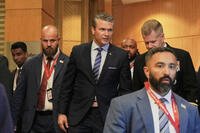Citing the U.S. experience in Iraq, former Defense Secretary Jim Mattis cautioned Tuesday against a hasty withdrawal of troops from Afghanistan, even as the sketchy outlines of a peace deal with the Taliban emerged.
"We can want the war over; we can declare the war over," Mattis said, but the threat of terrorism to the U.S. homeland emanating from Afghanistan will persist and "the enemy gets a vote."
He said the U.S. withdrawal from Iraq in 2011 during the Obama administration set the stage for the rise of the Islamic State and the regional chaos that resulted, although the U.S. military and the intelligence community warned at the time that the troops "most likely would have to go back in" to battle terrorism.
Mattis had no comment on the current situation in Afghanistan or the peace negotiations, but returned to the example of Iraq and the perils of leaving a turbulent region with a diminished U.S. military presence.
Related: Mattis Breaks Silence on Departure from Pentagon, Warns of Threats to Democracy
"The idea that we can now turn our back on this threat and somehow we're going to live in an island in the global community unaffected by it just doesn't match," he said. "We're going to have to learn from our past."
Mattis made the remarks in response to questions at an appearance to promote his book "Call Sign Chaos: Learning to Lead" at the Council on Foreign Relations in New York.
As in previous public events and interviews, he sidestepped direct criticism of President Donald Trump and avoided discussing the policy differences that led to his sudden resignation in December, when Mattis wrote that Trump deserved a civilian Pentagon leader whose views were "better aligned" with his own.
"There will come a time when I speak out on strategic issues," Mattis said, "but I need to give some period of time to those that have to carry out the responsibilities to protect this country in a very, very difficult age.
"When the time comes -- I'll know it when it's right. I can't tell you; I can't tell myself. I'm not keeping a secret. When the time's right to speak out about policy and strategy, I'll speak out," he added, noting that "I've frustrated everyone so far on this."
Mattis said he took the defense secretary job with the thought of spending four years at the Pentagon, but there "just came a point when I thought it was best" to resign.
Read more: Dunford Says He'll Never Talk about Trump, Even After Leaving the Military
However, though he avoided direct comment on Trump, Mattis returned repeatedly to the theme of the value of alliances to U.S. foreign policy and the respect that must be afforded to partnered nations -- comments that could be seen as implied criticism Trump's often disdainful remarks about NATO.
"We have to deal with reality" in that the U.S. needs allies when it goes to war, Mattis said.
In his 40-year military career as a Marine, leading troops in Iraq and Afghanistan, and as head of U.S. Central Command, "not once did I fight in an all-American formation," he said.
Overall, "I think we've militarized our foreign policy," Mattis said. "I want the diplomats in charge."
-- Richard Sisk can be reached at Richard.Sisk@Military.com.














